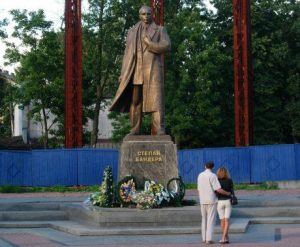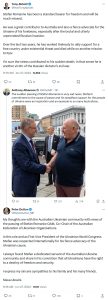The death this week (June 26) of Mr Stefan Romaniw OAM has been mourned by many, including numerous and very prominent Australian politicians. Among these is former Australian Prime Minister, Tony Abbott, whom Rob Harris notes (Tony Abbott, John Howard earn Putin’s ire, hit with sanctions by Kremlin, The Sydney Morning Herald, June 28, 2024):
paid tribute to the “late, great” Stefan Romaniw, co-chair of the Australian Federation of Ukrainian Organisations, who died suddenly this week in Poland after attending a conference in Lithuania.
Romaniw, 68, the former chairperson of the Victorian Multicultural Commission and Multicultural Arts Victoria, had rallied support for [his] country of heritage in recent years against Russian aggression, and was influential in the last push for … Canberra to divert billions in “dirty money” held in Australia since it sanctioned Russian oligarchs and others deemed to have aided and abetted the invasion and the occupation of Ukraine.
Others to have issued public statements (on Twitter/X, below) include the current Australian Prime Minister, Anthony Albanese, and Opposition leader Peter Dutton:
The reaction to Mr Romaniw’s death is inseparable from its context — his activism in support of Ukrainian resistance to its attempted annexation by Putin’s gangsta state — but, leaving aside this factor, and whatever contributions Romaniw made to Australian public life in the various other roles he undertook (see, for example, Farewell to Stefan Romaniw OAM, Fotis Kapetopoulos, Neos Kosmos, June 27, 2024), one aspect of his career that seems to have been overlooked in these tributes is his former role (2009–2022) as the leader of the Organisation of Ukrainian Nationalists (B): OUN/B. And, while there’s naturally a good deal of debate about the historical role of the OUN (and this, its ‘militant’, Banderist wing), I think it worthwhile noting some aspects of its activities in Ukraine in World War II; and, post-war, in Australia: especially as we are being called upon by some of the same figures who now lament his death to re-double our efforts in ‘the fight against antisemitism’.
Thus, with regards the OUN/B, the antisemitic and fascistic dimensions of these activities were documented by Mark Aarons, author of Sanctuary: Nazi Refugees in Australia (William Heinemann, 1989: reviewed by Drew Cottle for the Australian Society for the Study of Labour History here) and War Criminals Welcome: Australia, a Sanctuary for Fugitive War Criminals Since 1945 (Black Inc., 2001), relevant portions of which I republish below.
In chapter three of Sanctuary, ‘ABN is for Action’, Aarons writes that:
By the beginning of 1957 the small enclaves of former Nazi collaborators, hidden among the mass of Central and Eastern European migrants in their new homeland, felt so secure that they organised a major political convention. The key speaker was Jaroslav Stetsko, one of the most senior international émigré Nazi leaders. Stetsko arrived in April to establish the Australian Central Delegacy of the Anti-Bolshevik Bloc of Nations (ABN), an international ‘peak council’ of émigré Nazis which had helped Western intelligence to launch what proved to be a disastrous series of operations behind the Iron Curtain in the late 1940s and early 1950s …
Who were these ‘anti-bolsheviks’ who met in 1957 to form the Australian branch of the international ABN? According to its own version of history, this alliance of anti-communist crusaders was born in 1943 in the Ukraine where Jaroslav’s Stetsko’s Organisation of Ukrainian Nationalists was defending ‘the honor of the Ukrainian nation during World War II’ as the leader of both the anti-Nazi and anti-communist armed struggle to achieve ‘Ukrainian independence and freedom’ …
However, the true history of ABN is somewhat different. United States intelligence supremo, Allen Dulles, says that the ABN was created from three extreme right-wing nationalist organisations …
The most prominent of these groups, the OUN, was formed in 1929 by fascist-oriented Ukrainians, distinctly anti-parliamentary, anti-democratic and pro-Nazi, who from the beginning forged close links with the German Nazi Party through one of its chief ideologists, Alfred Rosenberg [1893–1946] …
[In 1939, following the signing of the Molotov-Ribbentrop pact and the assignment of the Polish-dominated Ukrainian area to Stalin, Stepan Bandera and] Stetsko led a split from the main OUN leadership, establishing an even more radical fascist organisation named OUN/B, after its supreme leader, Stepan Bandera. The OUN/B adopted a virulently anti-Semitic, pro-Nazi program in April 1941, pledging to combat ‘the Jews as the prop of the Muscovite-Bolshevik regime’. This was not idle rhetoric; Bandera’s second-in-command, Stetsko, wrote in his memoirs that he approved of ‘the German methods of exterminating the Jews’ …
Aarons then proceeds to describe the Soviet repression of the Ukrainian nationalist uprising in Lvov in June 1941 (following the launch of Operation Barbarossa), the Nazi and OUN/B’s pogrom (resulting in the deaths of 7000 Jews as Soviet forces withdrew), the installation of Stetsko as Prime Minister, the disbandment of his government by the Nazis, and the subsequent imprisonment of he and Bandera in Sachsenhausen concentration camp. According to Aarons:
The repression of the Stetsko ‘government’ created a myth that he and the OUN/B were anti-Nazis, victims of German repression, helping them to establish their anti-communist credentials with the West after the war. The truth was that they never broke with the Nazis, and although their Ukrainian Insurgent Army (UPA), occasionally harried the Germans towards the end of the war, throughout most of the war years it carried out massacres of Jews and Poles and helped the Nazis to fight Soviet partisans and the Red Army … The OUN’s unofficial program was summarised by the slogan ‘Poles behind the Sun [river], Germans to Berlin, Jews to the gallows’. They implemented this policy with great savagery, as testified to by Jewish and Polish survivors who witnessed massacres perpetrated by the Banderovsky, as they were dubbed.
Finally, in War Crimes, with regards Stetsko’s reception in 1957, Aarons writes that:
Many prominent Australians received Stetsko during his 1957 visit, including Victorian Premier Henry Bolte, Sydney’s Cardinal Gilroy and Lord Mayor Harry Jensen, Melbourne’s Archbishop Mannix and Democratic Labor Party Senator Frank McManus. Most supported Stetsko’s anti-communist and nationalist crusade, apparently without inquiring into his deeper background.
One who did inquire, and who especially objected to the role of Stetsko’s ‘major champion’ Victorian Liberal Senator John Gorton in welcoming Stetsko to Australia, was Stephen Dattner, a Melbourne businessman and member of the Jewish Council to Combat Fascism and Anti-Semitism. Raising his concerns with Gorton over Stetsko’s warm reception, Dattner, who also considered himself ‘an anti-communist’, wrote:
‘I cannot regard service under this banner as redemption in whole or in part for crimes committed against my people.’ He also quoted from evidence given before the Nuremberg War Crimes Tribunal proving that the OUN and Stetsko had been responsible for massacring the Jews of Lvov in western Ukraine.
Any further commentary is superfluous.
See also : Differing views of a Ukrainian nationalist’s role in the Holocaust expose divisions over the past., Erika Solomon, The New York Times, July 13, 2022 /// ‘The Radical Right in Post-Soviet Ukraine’, Melanie Mierzejewski-Voznyak, in The Oxford Handbook of the Radical Right, Jens Rydrgen (ed.) (Oxford University Press, 2018) /// Bandera mythologies and their traps for Ukraine, Andrii Portnov, Open Democracy, June 22, 2016 /// Stepan Bandera: The Life and Afterlife of a Ukrainian Nationalist: Fascism, Genocide, and Cult, Grzegorz Rossoliński-Liebe (ibidem Press, 2014) | Sydney football fans’ fascist salute has its origins in ASIO’s post-war failure, Mark Aarons, The Jewish Independent, November 8, 2022 | antifa notes (june 22, 2024) : Stefan Eracleous, antisemites, cookers & other losers | Inquiry: Anarchists and the War in Ukraine, Contradictions, Vol.7, 2023 …



Alex Ryvchin of the Executive Council of Australian Jewry has also expressed regret about the fascist’s passing:
https://x.com/AlexRyvchin/status/1806116475096404191
Yeah I did see that — the mourning has been uniform/I’ve not seen any reference to Romaniw’s role as a prominent Banderist in any commentary.
Pingback: antifa notes (july 21, 2024) : #j25antifa | slackbastard